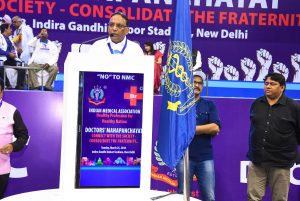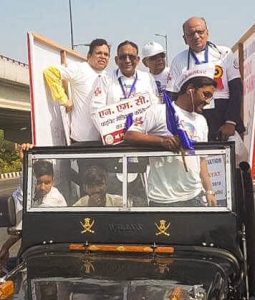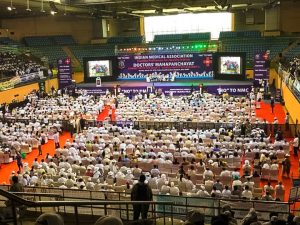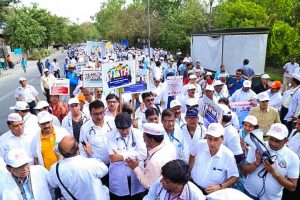DOCTORS’ MAHAPANCHAYAT
By Team Double Helical

The recently held the doctors’ Mahapanchayat out rightly rejects the proposed National Medical Commission Bill 2017 in one voice. The Mahapanchayat also rejects the recommendations of the Parliamentary Standing Committee on Health and Family Welfare thereon in their entirety as the said Bill along with the recommendations of the Parliamentary Committee are out and out anti-poor, anti-people, pro-rich, undemocratic, sponsors crosspathy through the Bridge Course, undermines the sanctity of University examinations throughthe licentiate examination patronizes, privatization, promotes corruption through discretionary provisions, harbors anti-federalism vide marginalization of the state and the State Medical Councils.
According to Mahapanchayat held on 25th March, 2018 at Indira Gandhi Indoor Stadium, New Delhi, in order to provide for effective meaningful, equitable, accessible, handy and affordable healthcare to rural populace, Govt. of India shall ensure that the appropriation for health spending to the extent of 6% of the Gross Domestic Produce (GDP), additional rural hospital are created, care and cure facilities at the existing rural hospitals are up-dated and augmented, much desired governance is rationalized and heavily needed motivating robust policy of incentives is put into place.
Dr Ravi Wankhedkar, National President, Indian Medical Association, the government must propose a strong Central Act prohibiting violence against doctors in all forms, hues, shades, matching with the enabling existing provisions in the Indian Penal Code, so as to evoke uniformity across the States in respect of its implementation and thereby extend much needed and desired immunity to the doctors while on duty from all forms of violence from any and all sources as they be and declare clinical establishments as safe zones in a real sense.

Clinical Establishment Act:
Dr Vinay Aggarwal, Former National President, IMA, the government must incorporate through appropriate amendments in the Clinical Establishment Act so as to provide for to the effect whereby the stabilization clause is modified to first-aid, single doctors establishment is out of the ambit, purview, and jurisdiction, a single window registration, standard treatment guidelines are designated as advisory in nature, composition of CEA Committee to exclude police personnel and chargeability to be made in accordance with the market forces but in a transparent and accountable manner and to remove police personnel from CEA Committee.
Dr R N Tandon, Secretary General, IMA, said, “There is a capping of compensation for any national calamity, railway accident, plane accident, sterilization  death in the public sector, on the similar lines a capping of compensation is a must claimable from a doctor not based on the income of the patient as the chargeable fee by the doctor is not based on the patient’s income for it is not open for him to discriminate the patient on the basis of the income hence the computation of capping on compensation claimable from a doctor ought to be on the basis of the compensation package as is depicted in the Drug & Cosmetic Rule regarding the death or injury during the drug trial.”
death in the public sector, on the similar lines a capping of compensation is a must claimable from a doctor not based on the income of the patient as the chargeable fee by the doctor is not based on the patient’s income for it is not open for him to discriminate the patient on the basis of the income hence the computation of capping on compensation claimable from a doctor ought to be on the basis of the compensation package as is depicted in the Drug & Cosmetic Rule regarding the death or injury during the drug trial.”
PCPNDT Act:
Dr Ravi Wankhekdar, said, “The Govt. of India through prompt, urgent and immediate amendments in the PCPNDT Act must evoke the concept and operation of graded punishment, no penal provision for clerical errors the stipulated six month’s training and certification thereto for doctors with MBBS qualification to be prospective in operation and effect and exemption to non pelvicultrasonologists from other procedural formalities except registration of the machine.”
Dr. A. Marthanda Pillai, Chairman, Action Committee, IMA, said, “The Govt. of India explicitly makes it loud and clear that there shall not be criminal prosecution of medical professionals in absence of the evidence based substantiation of the cardinal principle of mensrea and the prosecution shall be strictly in accordance with the guidelines laid down by the Hon’ble Supreme Court in its Pronouncement in the Jacob Mathew Vs. Union of India Case, and by incorporating the desired and appropriate amendments in the code of criminal procedure and Indian Evidence Act in accordance with the recommendations made by the Medical Council of India under the initiative of Indian Medical Association
RESOLUTIONS OF IMA – FEDERATION OF MEDICAL ASSOCIATIONS (FOMA)
1: All the speciality organizations of India stand with Indian Medical Association under the banner of FOMA in fighting NMC in its current form. We appeal to the Government to address our concerns and demands.
2: All the treatment guidelines and protocols under Clinical Establishment Act should be through FOMA
RESOLUTIONS OF SERVICE DOCTORS
1. An All India Medical cadre, “Indian Medical Services” will be the answer to the unequal health status of Indian states. This empowerment of medical profession will go a long way in taking Public Health Services closer to people. We demand establishment of Indian Medical Services.
2. Uniform pay scales throughout the country is the legitimate right of the medical profession. We demand implementation of uniform pay scales for service doctors across the country.
3. We condemn adhoc contractual appointment of doctors in Government Service for a meagre salary. We demand abolition of contractual appointments.
RESOLUTIONS OF IMA – MEDICAL STUDENTS’ NETWORK
1 No Bridge Course
At present MBBS is the basic qualification to practice modern medicine. This highly scientific degree is acquired after rigorous training for 5 and a half years in 14 subjects. Training of AYUSH doctors through bridge course of much shorter duration to allow them to practice modern medicine will be highly unscientific and usually detrimental to public health. It is also a big injustice to MBBS students who are undergoing a rigorous training module. Hence the medical students of this country reject bridge course in any form to safeguard scientific standards and Public Health. We unanimously urge to withdraw bridge course in modern medicine in any form.
2 Exit Exam
Medical students during the MBBS course have exams in 14 subjects comprising of more than 47 exams including theory ,clinics and viva. More than 50 internal exams are also conducted as part of MBBS course which is regulated by Medical Council of India and approved by the Government of India. All the exams which are conducted in very highly standardized format and they are held by universities which are both competent and approved. Admission to all medical colleges are regulated by common entrance exam conducted by government hence we fail to understand how is single new exam could be standard enough to surpass all the existing ones. The students in ChhatraSansadurged strongly to withdraw licensing exam in any form .Uniformity could be made in current exams of MBBS if required. Students decided to fight with all means if exit exam is unilaterally imposed.
3 Federal structure of NMC
Federal structure of India ensure that all States get representation and hence opportunity to address the peculiar needs of each region. Lack of adequate representation will deprive them of this opportunity. Hence ChhatraSansad has resolved to ask the government to make sure that all States get due representation in any medical regulatory authority.
4 The cost of Medical Education
The cost of Medical Education is the most disturbing factor in NMC. There is complete commercialization of Medical Education which is taking away the chances of lower socioeconomic class who are excellent in academics. The bill has failed to control the cost of Medical Education in the country. Government should regulate fee structure so that poor students could get access to medical education irrespective of socio economic status and region of dwelling.
5 Strike
It is decided by the ChhatraSansad to declare indefinite complete medical shutdown from April 2nd if national medical commission is not withdrawn. All medical colleges will be closed and medical students will boycott classes and exams on the call given by Dr Ravi Wankhedkar, National President of Indian Medical Association.
RESOLUTIONS OF CHHATRA SANSAD INDIRA GANDHI INDOOR STADIUM, NEW DELHI- 24.03.2018
Preamble
BRIDGE COURSE
How a person with 6 months of bridge course could be equated with a MD doctor who has studied for 8 long years..!! Who will be responsible for his mistakes..?Being an unskilled person will he be under the ambit of negligence?There is no exit test for bridge course..!!Unfortunately these bridge course half baked unskilled persons are being brought in the name of rural people. Our question is why second class healthcare for rural poor people? What is assuarance that these unskilled people will really serve rural areas only?
EXIT EXAM
We have to pass on 14 subjects and 42 examinations in theory, clinicals and viva to become MBBS doctors. All our exams are University exams. By creating an additional exit exam what does the government want to prove?
FEDERAL STRUCTURE OF NMC
State Representation is being marginalised in NMC. Right to vote and Right to Contest is being sabotaged by NMC.An entire body and Chairman should only be elected. Atleast 51% members should be elected.
RESOLUTIONS
1: No bridge course in any form to AYUSH and non doctors is acceptable.
2: No EXIT exam in any form
3: Withdraw NMC Bill.
OBSERVATIONS OF IMA ON THE PARLIAMENTARY STANDING COMMITTEE
By Team Double Helical

The PSC (PARLIAMENTARY STANDING COMMITTEE) on Health & F.W in its report presented to the Rajya Sabha on 20th March 2018 and laid on the table of Lok Sabha on 20th March 2018 amongst other things have made their observations clause wise in regard to the NMC Bill 2017.
The Committee has desired a greater clarity on the definition of the word Medical institution” under Clause 2 (i) to ascertain the institution it refers to specially in the context if the medical institution is to mean the medical college then the degrees are not conferred by the medical colleges but by the examining universities to which the medical colleges are affiliated.
However, the definition of the word modern medicine as included in the proposed Bill has been totally subverted when it comes to prescribing the bridge course to be availed by the State Governments as a part of capacity building for the purposes of rural healthcare service which is dichotomous.
Composition of the NMC: The Committee has altered the proposed composition of the National Medical Commission by increasing its number to 29 including the Chairperson, other than whom there would be 6 Ex-officio members that would include the President of UG Education Board, the President of the PG Medical Education Board, President of the Medical Assessment and Rating Board, the Director General Health Service and Director General of Indian Medical Council Research, and one person to represent the Ministry of the Central Govt. not below the rank of Secretary/Additional Secretary.
In addition, there shall be 22 part-time members of the Commission of which 3-Members would be appointed from 3different fields including management, law, medical ethics, health research, patient’s rights, advocacy, science & technology & economics. 10 Members to be appointed on rotational member from among the nominees of the States and Union Terr. in the Medical Advisory Council for a term of 2 years in terms of the manner as may be prescribed and 9 Members to be elected by the Registered Medical Practitioners from among themselves from such regional constituencies and in such manner as may be prescribed.
The composition as proposed by the Committee still does not give it a national, representative and a democratic character in as much as the representation of the State continues to be marginalized, universities do not find a representation and more so the representation of each state through a registered medical practitioner is not provided for. The nominee of the state has been evoked in an ex-officio manner in States where Health Sciences Universities are there and in States where there are no Health Universities, the Vice Chancellor of the traditional University with which the maximum number of medical colleges would be the ex-officio nominee of the state. As such the right of the State to have its nominee stands curtailed by the ex officio representation provided for.
More so, the Vice Chancellor of the Health Sciences, State Universities necessarily need not be a person possessing modern medicine qualification. Likewise the Vice Chancellor of a traditional university would be a man from any general faculty like Art, Commerce, Science, Social Science, Home Science, Education, Engineering & Technology or any other Faculty. As such, the change which has been proposed by the Committee to the composition to the National Medical Commission is totally “cosmetic” in character wherein but for a small augmentation of number nothing else is provided for.

Composition of the Search Committee: The composition of the Search Committee as included in the proposed Bill has been changed to the extent that the Chief Executive Officer of NitiAayog in the name of the conflict of interest has been deleted. 2-Experts from the part time members have been included to be nominated by the Central Govt. in the manner as may be prescribed.
The core issue is the desirability of a selected Chairperson of the Commission and the other autonomous Board which is totally disputable primarily on the ground that a selected person is not only going to be a salaried officer and thereby a public servant within the scope & meaning of Section 21 of the Indian Penal Code but also would be subjected to the disciplinary jurisdiction by the disciplinary authority and feasibility of such a person being autonomous in operation and effect is nonexistent. As such, the concept of a selected full time Chairperson and Chairmen of the Autonomous Board itself is an anti-thesis to the desired concept of autonomy.
Secretary of the Commission: The Committee, in regard to the Secretary of the Commission, has only suggested that he/she shall not be the Member Secretary of the Commission. However, the core objections on the proposed inclusion in the NMC Bill 2017 remain as they are specially in the context of the Secretary of the Commission being appointed by the Govt. of India and not by the Commission and the mandatory requirement of the said Secretary possessing PG qualification in modern medicine has been given a go-bye whereby the Secretary of the Commission necessarily would not be a person possessing modern medicine PG qualifications.
Conflict of Interest: The Committee has only suggested the cooling period to be of 2-years with reference to the Members of the Commission and Chairperson after the completion of their term not taking up any assignment with a private medical institution/college whose cases they might have dealt while in office, but the provisio where by the Govt of India is vested with doing away with the said prescribed embargo has been maintained whereby the proposition made by the committee is nothing short of an eye wash.
Appellate Jurisdiction : The Committee has proposed that the Appellate jurisdiction which in the proposed Bill is vested with the Central Govt. in respect of the decisions of the NMC has been done away with by proposing the constitution of a Medical Appellate Tribunal comprising of a Chairperson, who would be a sitting or retired Judge of the Supreme Court or a Chief Justice of High Court and 2 other members. One of the members should have a special knowledge in the medical profession / medical education and the other member with an experience in the field of health administration at the level of Secretary to the Govt. of India.
The remedy that has been proposed by the Committee is more dreadful than the disease itself. Chargeable fee: The Committee has proposed that fee charged by all unregulated Private Medical Colleges and the Deemed Universities be regulated atleast for 50% of their seats.
As such, the Committee has carved out a new Clause of Private colleges and Deemed universities where the fee is unregulated. In reality, there cannot be private college or Deemed university where the fee can be unregulated in the context of statutory mechanism that has been prescribed arising out of the pronouncement of the Hon’ble Supreme Court. As such, by the suggestions made by the Committee the resultant outcome is that the recommendation is redundant and infructous.
The quorum and frequency of the Medical Advisory Council: The recommendation of the committee prescribing 50% of the members as the requisite quorum and minimum 2 meetings of the Medical Advisory council is a well intended suggestion.
Centralized Counseling: The recommendation of the Committee to the effect that autonomy to universities/ and medical institutions as per the provision of the respective Acts should also be given permission to conduct common counseling for the vacant seats after the national and state level counseling to be done on merit basis from the candidates who have qualified NEET so as no vacant seats remain. This by itself is going to undo what has been gained out of centralized counseling and will give a free hand to the private universities to have their own game plans executed.
Licentiate Examination: The proposal of the Committee that the Licentiate examination be integrated with final year MBBS examination and be conducted at the state level by itself is counterproductive in as much as that it would transgress the authority and jurisdiction of examining university because the final MBBS examination would be the licentiate examination to be conducted by a designated authority at a state level other than the examining/ affiliating university by itself untenable.
The suggestion by the Committee pertaining to inclusion of other medical institution established by a separate Act of Parliament in the common pool of counseling for the PG admissions is well intended.
Autonomous Boards: The composition of the autonomous board has been altered in regard to its number from 3 to 5 with inclusion of an elected member thereat. However, even by the said proposition, the said Board does not gain a representative character and inadequacy of the number continues to the limit and desired optimal performance.
The recommendation of the Committee, that the Ethics and Registration Board shall be headed by a Retd. Judge of the High Court but would not be a ex officio member of the NMC is paradoxical. It being proposed in the name of the said Board to be autonomous of the NMC is superfluous because the Appellate jurisdiction has not been explicitly provided for.
1. Inclusion of Family Medicine: The suggestion of the Committee that medical colleges running PG Course in medical and Surgical specialties, Pediatrics and Obs& Gynae shall have to establish PG courses in Family Medicine. However in absence of a Department of Family medicine as a must at the UG Level, the proposed mandate is illusory as it would never fructify.
2. Functioning of MARB: The recommendation of the Committee that the modalities of assessment should be based on an outcome based model rather than emphasis on infrastructure, staffing and process which is misleading to the extent that the outcome based assessment cannot be at the cost of infrastructural assessment as infrastructure has a big role to play towards generating the desired outcome.
3. Levying of penalty: The recommendation of the Committee on the said count to the effect that an alternative provision be made for warning, subsequent reasonable monetary penalty followed by adequate time to address the deficiency and in case the lacuna persist a provision for de recognition for a certain period, subject to adequate checks and balances although sounds as if instilling confidence in reality is inoperable for want of an explicit clause for withdrawal of recognition for a specified period or permanently is not provided for in the proposed Bill and what is not included in the parent Act cannot be given effect through subordination legislation.
4. Screening Test: The recommendation by the Committee that a foreign citizen who is enrolled in his country as a medical practitioner in accordance with the Law, may be permitted to practice medicine and surgery sublet to qualifying the screening test meant for foreign medical graduates.
It is pertinent to note that the screening test contemplated under Section 13 of the present Indian Medical Council Act would cease to exist on the day the NMC Bill is promulgated would result in repeal of the said Act making screening nonexistent. The proposed Bill not providing for the screening test makes the suggestions by the Committee non operable and thus superfluous.
5. Bridge Course: The suggestions made by the PSC, the Bridge Course as proposed in the NMC Bill 2017 should not be mandatory but the sTates can avail the same as a part of capacity building exercise for the professionals of other pathies and have broadened the ambit thereto to the professionals of pharmacy, nursing and have kept it open ended by ending it the word “etc”. As such, the suggestions so made is nothing short of endorsing, legalizing and validating “quackery”, whereby the half baked professionals liberally granted permission to practice medicine would be playing with the health of the poor and gullible and make a mockery of the so called effective healthcare delivery system aimed at welfare of the people ending up in causing vulgar ill-fare.
The clauses of the Bill that have been adopted by the Committee as it is, the observations of the IMA on the said count stand as they are as the said concerns remain unmitigated.
In conclusion, summary and nutshell it can be inevitably concluded that the recommendations of the PSC are totally cosmetic in nature and illusory in character and thus end up in serving no public cause.

